Incontinence Advice
Managing incontinence at night: Treating night-time incontinence
Waking up to wet sheets can feel frustrating, embarrassing and exhausting. But you're not alone – many people of all ages quietly deal with night-time incontinence.
Bed-wetting in adults is not uncommon, and it can occur for a variety of reasons. Fortunately, it is often treatable and manageable. If you’re struggling with night-time incontinence, this article will walk you through some practical steps to manage it. From adjusting what you drink to using the right incontinence products, small changes can make a big difference to your sleep and confidence.
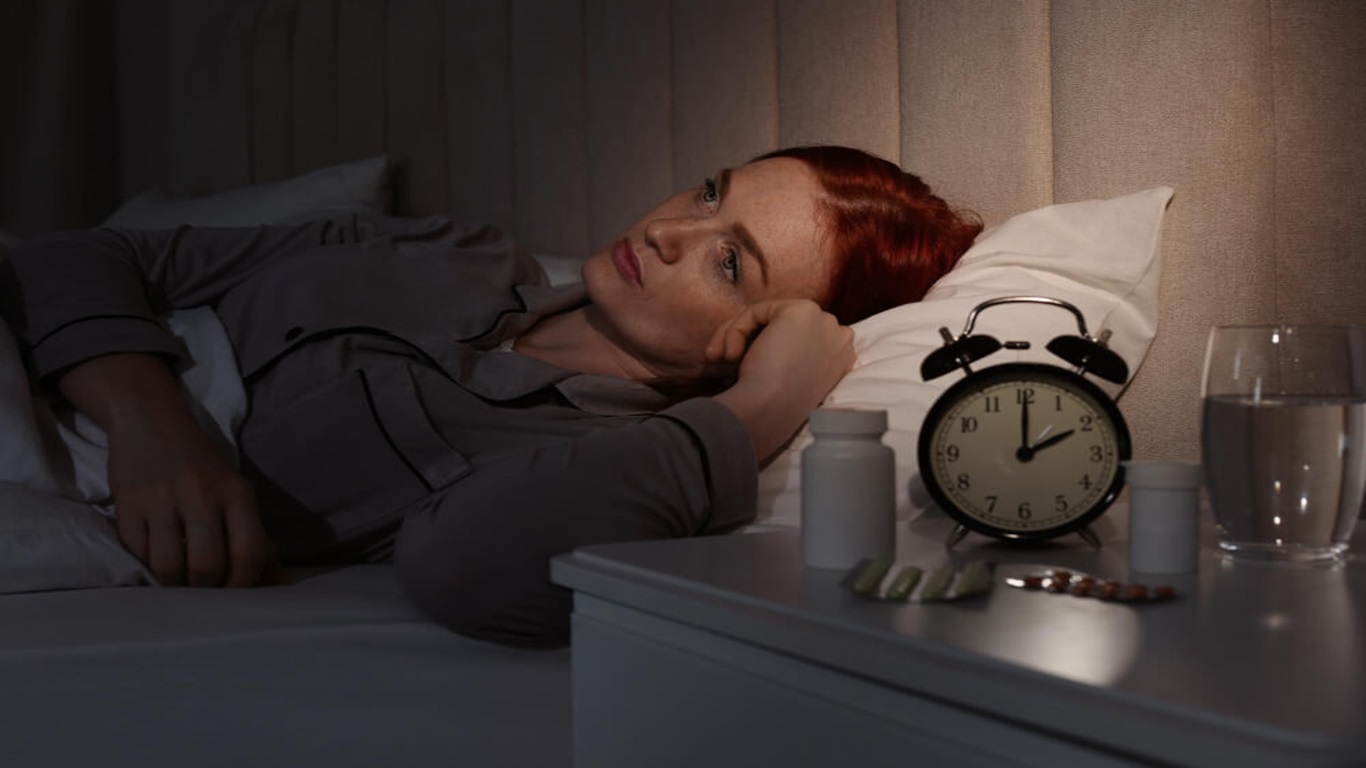
Key points
- Night time incontinence can affect anyone, regardless of age.
Adjusting fluid intake and reviewing medications may reduce symptoms.
Products like bed mats and incontinence pants offer discreet protection.
Support from a partner and healthcare professional can ease the emotional impact.
Night-time incontinence is often treatable with the right approach.
- The medical term for the condition is ‘nocturnal enuresis.’
Managing incontinence at night
How does incontinence affect someone at night?
Incontinence at night doesn’t just mean waking up to wet or soiled sheets – it can have a much bigger impact on your daily life. For many adults, especially those who haven’t experienced bladder issues before, it can feel confusing and isolating. It’s more common than many people realise, and it’s important to recognise that it is a medical condition; therefore, nothing to be ashamed of.
Emotional effects
Embarrassment is common, especially when sharing a bed or bedroom with someone else. This can lead to disrupted sleep, low mood and anxiety around bedtime. For some, it can lead to avoiding overnight stays or holidays altogether.
Impact on sleep and overall health
Changing clothes and bedding or using the toilet multiple times at night can leave you feeling exhausted the next day. Over time, poor sleep can affect your focus, energy and overall well-being.
A new experience for some, a long-term condition for others
Some people may develop night-time incontinence suddenly due to medical issues, while others have been managing it for years. Either way, it can feel like a step backwards, especially if it reminds you of childhood bed-wetting.
Stay dry through the night with MoliCare Premium Mobile
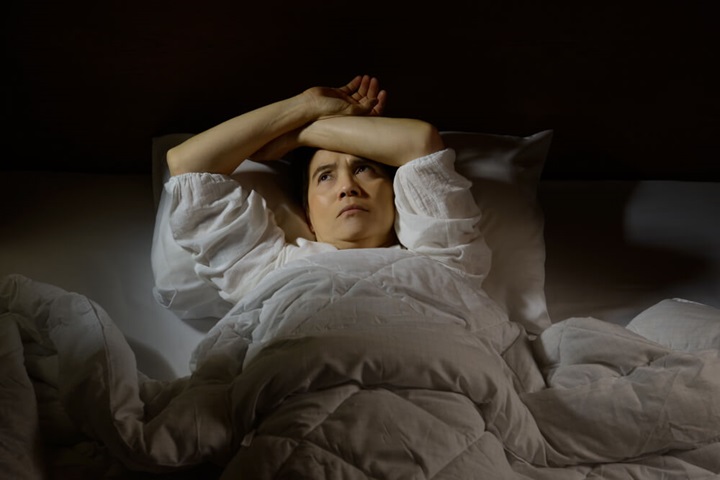
How can you deal with night-time incontinence?
If you’re unsure where to start, a few simple changes may help ease your symptoms and give you a better night’s rest.
Adjust your fluid intake
What you drink – and when – can make a difference. Try to avoid foods and drinks that irritate the bladder, including caffeine and alcohol in the evening, and reduce how much you drink in the last hour or two before bed. However, staying hydrated is important, so the idea is to focus more on timing than quantity. Find out how many times a day you should wee and learn more about urine frequency throughout the day.
Consult a healthcare professional
Night-time incontinence might be a sign of a treatable condition, such as a urinary tract infection or an overactive bladder. Other causes can include type 2 diabetes or, in men, an enlarged prostate. A healthcare professional can help identify any underlying health conditions that may be contributing to the problem.
Before your appointment, consider noting down:
When accidents happen
How much you’re drinking (and when)
What you regularly drink (e.g., alcohol or caffeine)
Whether you have other symptoms such as pain, urgency or frequency
Recent changes to your medication
Some medications, such as diuretics (water tablets), sleeping pills or psychiatric drugs, can play a part in night-time incontinence. Mentioning your medication can lead to useful adjustments.

What aids can help with night-time incontinence?
Night-time incontinence doesn’t have to take over your life. While it can feel frustrating and unpredictable, many helpful products and techniques can make things more manageable. For many, small changes combined with the right support can improve both comfort and confidence.
To help with staying dry throughout the night and getting better sleep, there’s a range of discreet, comfortable products that can help, such as:
Incontinence pants and pads: Night-time incontinence pads are extra absorbent, locking in moisture for longer to reduce the chance of leaks. These are often thicker than daytime versions and shaped for sleeping positions.
Bed mats and mattress protectors: For extra reassurance, incontinence bed sheets can sit under your body while you sleep. Mattress protectors are also a smart investment as they create a waterproof barrier, keeping your mattress clean and dry.
Barrier creams and gentle skincare: Urine can irritate the skin, especially with prolonged contact during sleep. A skin barrier cream applied before bed helps protect your skin and reduce soreness.
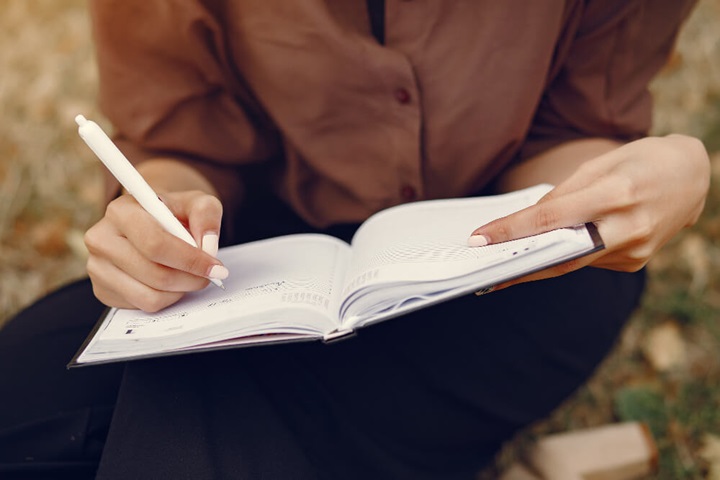
Incontinence alarms
Incontinence alarms are small devices that attach to underwear, pads, or bedding. They sound or vibrate when they detect moisture, gently waking the sleeper so they can use the toilet.Although often used for children, many adults find them helpful too – especially when used as part of bladder training.
Bladder training
Bladder training is a behavioural technique that can improve bladder control by going to the toilet on a set schedule then gradually increasing the time between trips to the toilet. The aim is to strengthen the bladder muscles, improving the ability of the bladder to hold larger volumes of urine for longer periods. Although this technique can only be practised in the day, as the bladder muscles are strengthened, night-time bladder control is also improved. Tracking your habits in a bladder diary can help spot patterns and monitor progress.
Distraction strategies to reduce the sense of urgency can be used in between toilet visits, such as:
- Taking deep breaths or sitting still.
- Distracting yourself with a different task.
- Doing short, rapid pelvic floor squeezes when the urge hits.
By taking these steps, you can reduce symptoms, regain control and feel more comfortable.
Medication options
If lifestyle changes and product support do not sufficiently improve night-time incontinence, medication may be an appropriate next step.
Your healthcare professional might prescribe something like Oxybutynin, which works by relaxing the bladder muscles and helping the bladder hold more liquid.
Other medications may also be used depending on the cause—especially if your incontinence is linked to an overactive bladder or a hormonal issue.
Managing night-time incontinence while sharing a bed
Worrying about leaking while sharing a bed is a common concern. It’s completely understandable to feel nervous—but it’s worth having an honest conversation with your partner. Many people are more understanding than you might expect.
If you're the partner of someone managing nighttime incontinence, offering practical help and emotional support can ease the pressure. Reassure them, be patient, and encourage them to seek medical advice if they haven’t already done so.
Older adults and nighttime incontinence
Older adults often experience incontinence at night due to age-related changes in bladder function or other medical conditions.
Here are some steps that may help:
Limit drinks a few hours before bed (but don’t cut them out entirely).
Stick to bladder-friendly drinks like water or diluted squash.
Avoid drinks containing caffeine or alcohol in the evening.
Use incontinence aids like bed mats and nighttime pads.
Set up a clear, easy route to the bathroom with night lighting.

Combat night-time incontinence with MoliCare®
In conclusion, night-time incontinence can be upsetting; however, it might be helpful and reassuring to learn that it is something many people experience, it can be treatable and there are effective ways to manage it. Whether you’re dealing with incontinence at night yourself or supporting someone who is, help is available from the team at MoliCare®.
Contact us today to explore our range of incontinence pads for adults and find the option that best meets your needs. We also recommend discussing your symptoms with your healthcare professional to determine the most appropriate approach for your individual circumstances.
FAQs
Is night-time incontinence common in adults?
Yes. While often under-reported due to embarrassment, it’s more common than many realise – especially among older adults or those with certain health conditions. It affects both men and women and can vary in severity.
Should I set a night-time toilet alarm?
If your doctor recommends it or if you find it helps, setting a timed alarm to use the toilet once or twice during the night (a method called ‘timed voiding’) can help reduce accidents.
Can diet affect night-time incontinence?
Yes. Certain foods and drinks can irritate the bladder or increase urine output. Try limiting:
Caffeinated drinks (e.g., coffee, tea, Coca-Cola)
Alcohol
Citrus fruits and juices
Spicy foods
Artificial sweeteners
Summer, J.V. (2025) Sleep Deprivation: Symptoms, Treatment, & Effects. Sleep Foundation [online] Available at: https://www.sleepfoundation.org/sleep-deprivation [accessed 28/05/2025]
Puckey, M., (2024) Oxybutynin. Drugs.com. [online] Available at: https://www.drugs.com/oxybutynin.html [accessed 09/05/2025]
Continence Matters (2017) Timed Voiding and Bladder Training. [online] Available at: https://continencematters.com/health-information/incontinence-and-prolapse/timed-voiding-and-bladder-training/ [accessed 28/05/2025]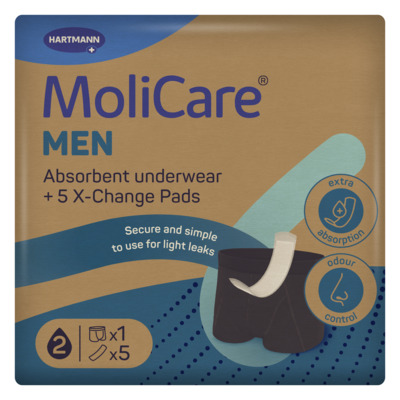 MoliCare® MEN Absorbent underwear + 5 X-Change Pads
<h3><strong>Men's washable incontinence pants with an invisible pad for extra protection</strong></h3>
<p>Feel confidently fresh all day with MoliCare® MEN Absorbent underwear with X-Change Pads. <br />
A discreet, simple-to-use solution for very light bladder weakness. Thanks to a special hidden pocket inside the underwear, you can easily insert a MoliCare X-Change Pad for extra protection which stays securely in place and is invisible. Just look for the layer of extra fabric inside the underwear and slip the pad into it for increased absorbency and security.<br />
With 4 layers of protection and a special leakproof technique MoliCare® MEN Absorbent underwear with X-Change Pads is designed to keep you feeling confident and dry for up to 12 hours*. The X-Change Pad converts liquid into gel to reliably lock away up to 25 teaspoons (approx. 125 ml) of urine and neutralise odours.<br />
The men’s washable incontinence pants are comfortable to wear and have a masculine, timeless design.<br />
Indistinguishable from normal underwear, 83%** of men say the product is a convincing alternative to conventional disposable products. There’s no need to change your underpants throughout the day, simply replace the exchangeable absorbent core whenever you need.<br />
*Hours will vary depending on amount of urine and individual bladder habits.<br />
**Internal test at Paul Hartmann AG, 12/2023, Top 2 Box, n= 16 men, Germany </p>
MoliCare® MEN Absorbent underwear + 5 X-Change Pads
<h3><strong>Men's washable incontinence pants with an invisible pad for extra protection</strong></h3>
<p>Feel confidently fresh all day with MoliCare® MEN Absorbent underwear with X-Change Pads. <br />
A discreet, simple-to-use solution for very light bladder weakness. Thanks to a special hidden pocket inside the underwear, you can easily insert a MoliCare X-Change Pad for extra protection which stays securely in place and is invisible. Just look for the layer of extra fabric inside the underwear and slip the pad into it for increased absorbency and security.<br />
With 4 layers of protection and a special leakproof technique MoliCare® MEN Absorbent underwear with X-Change Pads is designed to keep you feeling confident and dry for up to 12 hours*. The X-Change Pad converts liquid into gel to reliably lock away up to 25 teaspoons (approx. 125 ml) of urine and neutralise odours.<br />
The men’s washable incontinence pants are comfortable to wear and have a masculine, timeless design.<br />
Indistinguishable from normal underwear, 83%** of men say the product is a convincing alternative to conventional disposable products. There’s no need to change your underpants throughout the day, simply replace the exchangeable absorbent core whenever you need.<br />
*Hours will vary depending on amount of urine and individual bladder habits.<br />
**Internal test at Paul Hartmann AG, 12/2023, Top 2 Box, n= 16 men, Germany </p>
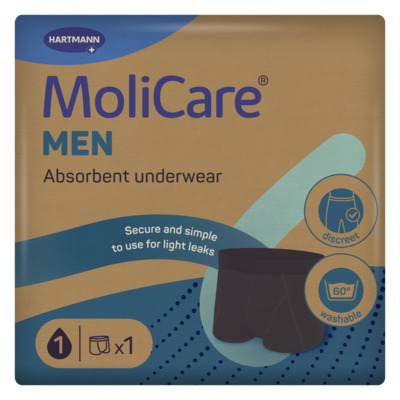 MoliCare® MEN Absorbent underwear
<h2><strong>Protective underwear for drips and dribbles in men</strong></h2>
<p>Get protection for men without the need for pads with MoliCare<sup>®</sup> Men Absorbent underwear. </p>
<p>Offering reliable leak protection, this washable men's underwear securely locks away urine thanks to its quick-dry technology. They look and feel exactly like your regular men’s boxers but with the subtle difference that they can hold up to 10 teaspoons of urine (50 ml). </p>
<p>Designed in Germany, MoliCare<sup>®</sup> Men underwear is dermatologically tested, free of harmful substances and Oeko-Tex 100 certified. Wash this men’s underpants for incontinence at 60° Celsius and use them again and again. </p>
<p><strong>Who is MoliCare<sup>®</sup> Men Absorbent underwear suitable for? </strong></p>
<p>MoliCare<sup>®</sup> Men underwear is for men who experience very light bladder weakness, resulting in small drops of spontaneous urine loss. The invisible men's bladder weakness pants are washable even at 60° Celsius, eliminating odour-causing bacteria.</p>
<p>Designed to look and feel like your normal underwear, they’re easy to put on and off.</p>
<h2><strong>Reusable and convenient solution for drips and dribbles</strong></h2>
<p>Don’t worry about dribbling after urination anymore. MoliCare<sup>®</sup> Men Absorbent underwear are discreet, washable men’s incontinence briefs offering a sustainable, comfortable and skin-friendly alternative to other hygiene products.</p>
<p>Indistinguishable from normal underwear, 87%* of men say the product is a convincing alternative to conventional disposable products.</p>
<p>Free of harmful substances, washable at 60° Celsius and suitable for tumble drying, MoliCare<sup>®</sup> Men Absorbent underwear combines leakproof protection and sustainability with a masculine, yet invisible design so no one will ever know you’re wearing washable incontinence pants. </p>
<p>* Internal test at Paul Hartmann AG, 12/2023, Top 2 Box, n= 16 men, Germany</p>
<p><strong>Caring for your reusable MoliCare<sup>®</sup> Men Absorbent underwear: a step-by-step guide</strong></p>
<ul>
<li>Wash before first use</li>
<li>Rinse out with cold water after use</li>
<li>Use a mild detergent to ensure underwear maintains its functionality. Do not use fabric softeners</li>
<li>Hygienically wash your MoliCare®Absorbent underwear at 60 °C</li>
<li>After washing you can tumble dry your underwear on a low heat</li>
<li>Following these steps will help your underwear stay fresh, clean and ready to wear</li>
</ul>
MoliCare® MEN Absorbent underwear
<h2><strong>Protective underwear for drips and dribbles in men</strong></h2>
<p>Get protection for men without the need for pads with MoliCare<sup>®</sup> Men Absorbent underwear. </p>
<p>Offering reliable leak protection, this washable men's underwear securely locks away urine thanks to its quick-dry technology. They look and feel exactly like your regular men’s boxers but with the subtle difference that they can hold up to 10 teaspoons of urine (50 ml). </p>
<p>Designed in Germany, MoliCare<sup>®</sup> Men underwear is dermatologically tested, free of harmful substances and Oeko-Tex 100 certified. Wash this men’s underpants for incontinence at 60° Celsius and use them again and again. </p>
<p><strong>Who is MoliCare<sup>®</sup> Men Absorbent underwear suitable for? </strong></p>
<p>MoliCare<sup>®</sup> Men underwear is for men who experience very light bladder weakness, resulting in small drops of spontaneous urine loss. The invisible men's bladder weakness pants are washable even at 60° Celsius, eliminating odour-causing bacteria.</p>
<p>Designed to look and feel like your normal underwear, they’re easy to put on and off.</p>
<h2><strong>Reusable and convenient solution for drips and dribbles</strong></h2>
<p>Don’t worry about dribbling after urination anymore. MoliCare<sup>®</sup> Men Absorbent underwear are discreet, washable men’s incontinence briefs offering a sustainable, comfortable and skin-friendly alternative to other hygiene products.</p>
<p>Indistinguishable from normal underwear, 87%* of men say the product is a convincing alternative to conventional disposable products.</p>
<p>Free of harmful substances, washable at 60° Celsius and suitable for tumble drying, MoliCare<sup>®</sup> Men Absorbent underwear combines leakproof protection and sustainability with a masculine, yet invisible design so no one will ever know you’re wearing washable incontinence pants. </p>
<p>* Internal test at Paul Hartmann AG, 12/2023, Top 2 Box, n= 16 men, Germany</p>
<p><strong>Caring for your reusable MoliCare<sup>®</sup> Men Absorbent underwear: a step-by-step guide</strong></p>
<ul>
<li>Wash before first use</li>
<li>Rinse out with cold water after use</li>
<li>Use a mild detergent to ensure underwear maintains its functionality. Do not use fabric softeners</li>
<li>Hygienically wash your MoliCare®Absorbent underwear at 60 °C</li>
<li>After washing you can tumble dry your underwear on a low heat</li>
<li>Following these steps will help your underwear stay fresh, clean and ready to wear</li>
</ul>
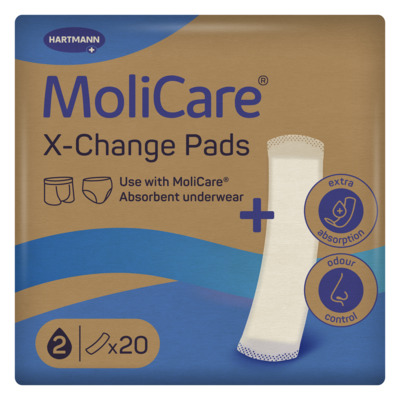 MoliCare® X-Change Pads
<h3><strong>Invisible underwear pads providing extra protection for MoliCare® Absorbent underwear</strong></h3>
<p>Enjoy that dry feeling for up to 12 hours* with MoliCare® X-Change Pads. <br />
Designed to add increased protection to MoliCare® Absorbent underwear, MoliCare® X-Change pads have a highly absorbent core that turns liquid into gel and neutralises unpleasant odours. The pad can hold up to 20 teaspoons (approx. 100 ml) of urine.<br />
Invisible due to the integrated pocket in MoliCare® Absorbent underwear, the pad stays in place and gives you the security of extra leakproof protection when you need it most. Just look for the extra layer of fabric inside the underwear and slip the pad into the pocket for increased absorbency and security against light bladder weakness. This unique concept is patented by HARTMANN.<br />
MoliCare® X-Change incontinence pads for underwear are easy to change and dispose of in public washrooms. Made to reduce disposable waste by 78 % compared to other incontinence products, they are free of silver chloride and other biocides that can have a negative impact on the intimate flora and environment.<br />
*Hours will vary depending on amount of urine and individual bladder habits.</p>
MoliCare® X-Change Pads
<h3><strong>Invisible underwear pads providing extra protection for MoliCare® Absorbent underwear</strong></h3>
<p>Enjoy that dry feeling for up to 12 hours* with MoliCare® X-Change Pads. <br />
Designed to add increased protection to MoliCare® Absorbent underwear, MoliCare® X-Change pads have a highly absorbent core that turns liquid into gel and neutralises unpleasant odours. The pad can hold up to 20 teaspoons (approx. 100 ml) of urine.<br />
Invisible due to the integrated pocket in MoliCare® Absorbent underwear, the pad stays in place and gives you the security of extra leakproof protection when you need it most. Just look for the extra layer of fabric inside the underwear and slip the pad into the pocket for increased absorbency and security against light bladder weakness. This unique concept is patented by HARTMANN.<br />
MoliCare® X-Change incontinence pads for underwear are easy to change and dispose of in public washrooms. Made to reduce disposable waste by 78 % compared to other incontinence products, they are free of silver chloride and other biocides that can have a negative impact on the intimate flora and environment.<br />
*Hours will vary depending on amount of urine and individual bladder habits.</p>
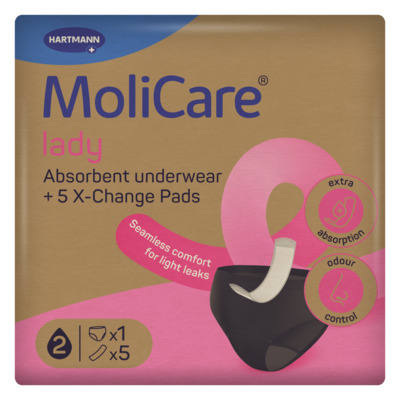 MoliCare® Lady Washable & Absorbent Underwear X-Change Pads
<h2>Why Choose MoliCare<sup>®</sup> washable bladder weakness underwear?</h2>
<p> </p>
<ul>
<li>Unique washable incontinence pants for ladies with a hidden pocket to insert MoliCare<sup>®</sup> X-Change Pads for extra protection</li>
<li>Versatile daily hygiene product for very light bladder weakness</li>
<li>In combination with the exchangeable X-Change Pads, these washable incontinence pants safely lock away up to 30 teaspoons (approx. 149 ml) of urine for a secure, dry feeling</li>
<li>Leakproof pant with a seamless and invisible design for maximum discretion</li>
<li>MoliCare<sup>®</sup> X-Change Pads provide reliable odour control and are easily inserted into the pants and changed as required</li>
<li>Hygienically wash the incontinence pants at 60°C, without the X-Change Pad</li>
<li>78% less plastic waste compared to conventional disposable incontinence products</li>
<li>Suitable for tumble drying</li>
<li>Free of silver chloride and other biocides that can negatively affect vaginal flora</li>
<li>Designed in Germany and made from soft, gentle-on-skin fabrics</li>
<li>This pack contains one pair of women's washable incontinence pants in Size M or Size L plus 5 X-Change-Pads</li>
<li>Designed in Germany and made from soft, gentle-on-skin fabrics</li>
<li>Medium size corresponds to EU size 40/42, or dress size 14-16</li>
</ul>
MoliCare® Lady Washable & Absorbent Underwear X-Change Pads
<h2>Why Choose MoliCare<sup>®</sup> washable bladder weakness underwear?</h2>
<p> </p>
<ul>
<li>Unique washable incontinence pants for ladies with a hidden pocket to insert MoliCare<sup>®</sup> X-Change Pads for extra protection</li>
<li>Versatile daily hygiene product for very light bladder weakness</li>
<li>In combination with the exchangeable X-Change Pads, these washable incontinence pants safely lock away up to 30 teaspoons (approx. 149 ml) of urine for a secure, dry feeling</li>
<li>Leakproof pant with a seamless and invisible design for maximum discretion</li>
<li>MoliCare<sup>®</sup> X-Change Pads provide reliable odour control and are easily inserted into the pants and changed as required</li>
<li>Hygienically wash the incontinence pants at 60°C, without the X-Change Pad</li>
<li>78% less plastic waste compared to conventional disposable incontinence products</li>
<li>Suitable for tumble drying</li>
<li>Free of silver chloride and other biocides that can negatively affect vaginal flora</li>
<li>Designed in Germany and made from soft, gentle-on-skin fabrics</li>
<li>This pack contains one pair of women's washable incontinence pants in Size M or Size L plus 5 X-Change-Pads</li>
<li>Designed in Germany and made from soft, gentle-on-skin fabrics</li>
<li>Medium size corresponds to EU size 40/42, or dress size 14-16</li>
</ul>
